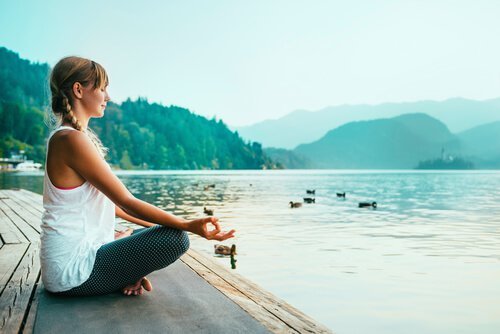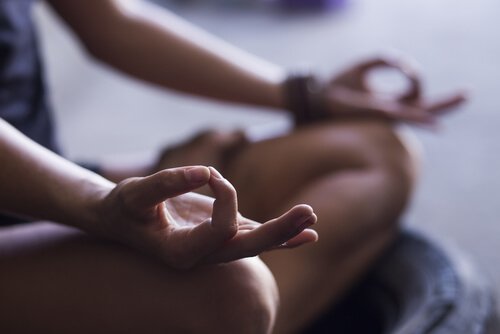8 Myths About Mindfulness

Mindfulness is a tool to become aware of our movement, feelings and reactions. All these facets are crucial in life and the moments that make up our days. That’s why it’s so good for us; it helps us come off that autopilot we go on for a good part of the day.
Having said that, mindfulness has become in many ways the “fashionable” thing to do and the answer for any problem you may have. However, its origins are not at all what some may think.
There are many preconceived notions that are preventing many people from enjoying its benefits. We’re now going to go through 8 myths about mindfulness — read on and find out the truth.
It’s not only about focusing your mind
“Mindfulness” is commonly used to refer to what we know as meditation and breathing exercises. Its purpose, they say, is to control our stray thoughts and keep our minds focused. However, this simplicity hides a not-so-simple background. If we go a bit deeper, we will see that mindfulness is much more than this.
It comes from the Tibetan word drenpa, which mean to remember, retain or collect. Therefore it doesn’t consist exclusively of observing our mind, but actually teaches us how to be conscious of every moment of our lives, thereby improving the quality of our thoughts.
Concentrating on “the here and now” is the means to doing it. Doesn’t a tennis player try to improve their backhand by practicing for hours and hours on the tennis court? If that’s the case, then why shouldn’t we teach our conscience to be more efficient by training it?

Mindfulness is not psychological therapy
Neither meditation nor mindfulness are psychological therapies. Under no circumstances should they replace psychological treatment or medication. So if you have been diagnosed with a mental health disorder you should always see a medical professional and follow their advice.
Relaxation and concentration exercises can complement treatment and medication, but not be a substitute. That’s why it’s wrong to think that they have “therapeutic effects”. A better term would be “regulatory effects”, as they don’t take away from other treatment, but complement it.
You need to empty your mind if you want to meditate
One of the great myths about mindfulness is the idea that you have to empty your mind in order to practice it. Nothing is further from the truth. In fact, emptying it is precisely what we shouldn’t do. We should instead direct it where we want it to go. In other words, master it. It is about guiding our mind and not letting external stimuli do it for us.
Our brain is designed to think. Because of this, the more we try to ward off negative thoughts, the more intense they will become. Block is a verb that totally goes against the philosophy of those who practice mindfulness. On the contrary, what they try to do is let everything flow; they free their thoughts.
“When the turbulence of distractions diminishes and our mind calms down, a deep feeling of happiness and satisfaction that helps us cope with the hustle and bustle of daily life arises naturally within us”
-Ven. Gueshe Kelsang Gyatso Rimpoche-
Joy and positivism come from you
This is another of the great myths about mindfulness. Its aim is to help you live in the present. But mindfulness isn’t synonymous with joy or with positivism. By doing these exercises, you won’t necessarily have a smile on your face all the time or see everything through rose-colored glasses. Accept everything that comes to you, whether it be good or bad. That depends entirely on you.
We do know that mindfulness will help you live these moments more intensely. Both the good ones and the bad ones. It will help you experience the things that happen to you better. You’ll be able to channel and manage your emotions better. It helps you not to make value judgments and to instead be more objective in your daily life.

Changing your habits
Experts say that in 21 days anyone can change or start a habit. Unfortunately this is not the case with mindfulness. One good thing is that you don’t need to practice it every day or every week, because its benefits are immediate.
If you do it once a year you’ll notice the same results as if you did it twice a day. You only need willpower. Of course, you have to know the proper technique to perform it correctly. It’s not just about going to secluded place and breathing.
It takes too much time
Another of the great myths about mindfulness is easier to argue against: lack of time. There is always time, but there are also many excuses. It’s often the case that it takes you longer to think about why you cannot do it than to actually just do it.
You only need 10 or 15 minutes a day, plus the desire to focus. You may be walking, cooking, reading… but you can still be focused on what is happening in your life at any particular moment. If you do it continuously, you’ll gradually see that you can meditate without hardly realizing it.
It’s a way of escaping reality
Many believe that this meditation technique tries to isolate you from your life and help you get away from the stress of everyday life. But this is not at all true. What you are attempting to do is to reflect and try to find the origin of the stress.
By giving it your undivided attention, you’ll be able to observe it and be conscious of it. You shouldn’t try to get into a bubble and get away from reality. You should do quite the opposite: try to shed light on your problem, focusing all your attention on it.

Boring?
Out of all the myths about mindfulness on our list today, this is the most common one. People say it’s boring. But this is not the case. There are so many ways of doing it… Do you really think self-discovery can be called boring?
Maybe we should talk about fear rather than boredom. A fear of discovering what we would see if we would just look inside ourselves. The unknown terrifies us. But even more so if it’s about something that has caused us pain at some point in our lives. It’s time for you to finally free yourself from all of this. This is your moment!
Mindfulness is a tool to become aware of our movement, feelings and reactions. All these facets are crucial in life and the moments that make up our days. That’s why it’s so good for us; it helps us come off that autopilot we go on for a good part of the day.
Having said that, mindfulness has become in many ways the “fashionable” thing to do and the answer for any problem you may have. However, its origins are not at all what some may think.
There are many preconceived notions that are preventing many people from enjoying its benefits. We’re now going to go through 8 myths about mindfulness — read on and find out the truth.
It’s not only about focusing your mind
“Mindfulness” is commonly used to refer to what we know as meditation and breathing exercises. Its purpose, they say, is to control our stray thoughts and keep our minds focused. However, this simplicity hides a not-so-simple background. If we go a bit deeper, we will see that mindfulness is much more than this.
It comes from the Tibetan word drenpa, which mean to remember, retain or collect. Therefore it doesn’t consist exclusively of observing our mind, but actually teaches us how to be conscious of every moment of our lives, thereby improving the quality of our thoughts.
Concentrating on “the here and now” is the means to doing it. Doesn’t a tennis player try to improve their backhand by practicing for hours and hours on the tennis court? If that’s the case, then why shouldn’t we teach our conscience to be more efficient by training it?

Mindfulness is not psychological therapy
Neither meditation nor mindfulness are psychological therapies. Under no circumstances should they replace psychological treatment or medication. So if you have been diagnosed with a mental health disorder you should always see a medical professional and follow their advice.
Relaxation and concentration exercises can complement treatment and medication, but not be a substitute. That’s why it’s wrong to think that they have “therapeutic effects”. A better term would be “regulatory effects”, as they don’t take away from other treatment, but complement it.
You need to empty your mind if you want to meditate
One of the great myths about mindfulness is the idea that you have to empty your mind in order to practice it. Nothing is further from the truth. In fact, emptying it is precisely what we shouldn’t do. We should instead direct it where we want it to go. In other words, master it. It is about guiding our mind and not letting external stimuli do it for us.
Our brain is designed to think. Because of this, the more we try to ward off negative thoughts, the more intense they will become. Block is a verb that totally goes against the philosophy of those who practice mindfulness. On the contrary, what they try to do is let everything flow; they free their thoughts.
“When the turbulence of distractions diminishes and our mind calms down, a deep feeling of happiness and satisfaction that helps us cope with the hustle and bustle of daily life arises naturally within us”
-Ven. Gueshe Kelsang Gyatso Rimpoche-
Joy and positivism come from you
This is another of the great myths about mindfulness. Its aim is to help you live in the present. But mindfulness isn’t synonymous with joy or with positivism. By doing these exercises, you won’t necessarily have a smile on your face all the time or see everything through rose-colored glasses. Accept everything that comes to you, whether it be good or bad. That depends entirely on you.
We do know that mindfulness will help you live these moments more intensely. Both the good ones and the bad ones. It will help you experience the things that happen to you better. You’ll be able to channel and manage your emotions better. It helps you not to make value judgments and to instead be more objective in your daily life.

Changing your habits
Experts say that in 21 days anyone can change or start a habit. Unfortunately this is not the case with mindfulness. One good thing is that you don’t need to practice it every day or every week, because its benefits are immediate.
If you do it once a year you’ll notice the same results as if you did it twice a day. You only need willpower. Of course, you have to know the proper technique to perform it correctly. It’s not just about going to secluded place and breathing.
It takes too much time
Another of the great myths about mindfulness is easier to argue against: lack of time. There is always time, but there are also many excuses. It’s often the case that it takes you longer to think about why you cannot do it than to actually just do it.
You only need 10 or 15 minutes a day, plus the desire to focus. You may be walking, cooking, reading… but you can still be focused on what is happening in your life at any particular moment. If you do it continuously, you’ll gradually see that you can meditate without hardly realizing it.
It’s a way of escaping reality
Many believe that this meditation technique tries to isolate you from your life and help you get away from the stress of everyday life. But this is not at all true. What you are attempting to do is to reflect and try to find the origin of the stress.
By giving it your undivided attention, you’ll be able to observe it and be conscious of it. You shouldn’t try to get into a bubble and get away from reality. You should do quite the opposite: try to shed light on your problem, focusing all your attention on it.

Boring?
Out of all the myths about mindfulness on our list today, this is the most common one. People say it’s boring. But this is not the case. There are so many ways of doing it… Do you really think self-discovery can be called boring?
Maybe we should talk about fear rather than boredom. A fear of discovering what we would see if we would just look inside ourselves. The unknown terrifies us. But even more so if it’s about something that has caused us pain at some point in our lives. It’s time for you to finally free yourself from all of this. This is your moment!
This text is provided for informational purposes only and does not replace consultation with a professional. If in doubt, consult your specialist.







